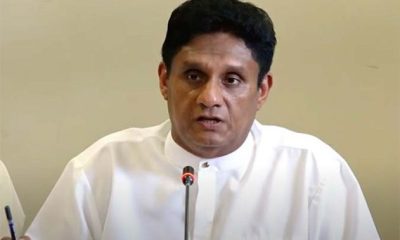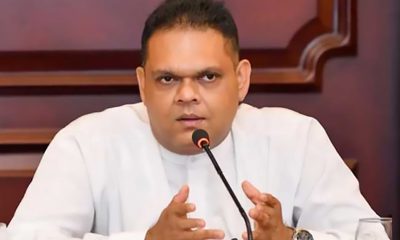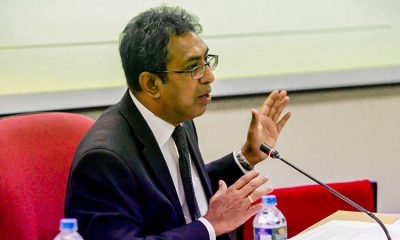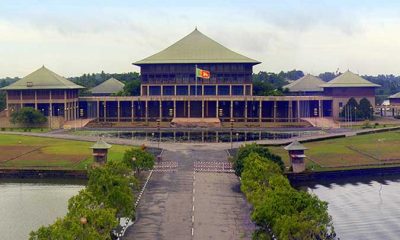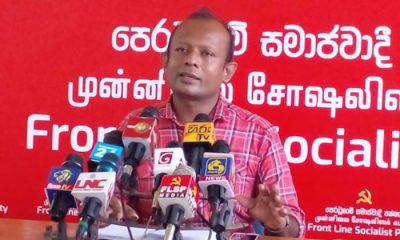News
Resolution on IMF deal passed with 120 votes
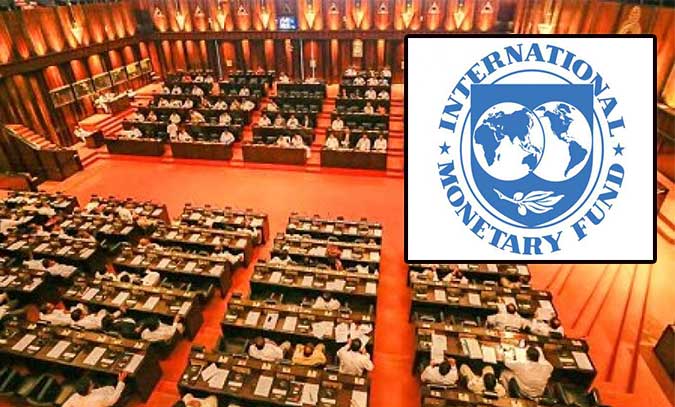
The Resolution for the implementation of the arrangement under the Extended Fund Facility (EFF) of the IMF for Sri Lanka was passed in Parliament by a majority of 95 votes with 120 voting in favour and 25 voting against it.
The Parliamentary debate on the agreement reached with the IMF started after President Ranil Wickremesinghe made a special statement in Parliament on Wednesday. The debate was held for three days.The SJB abstained since the second half of the final day debate objecting to it stating that government failed to table the IMF/EFF agreement in the House.
After leaving the Chamber, the SJB issued the following release under the signature of Chief Opposition Whip and Kandy District MP Lakshman Kiriella: “The Government is seeking Parliamentary approval, post facto, for the agreement it has entered into with IMF based on Cabinet approval. This is not the first time Sri Lanka is obtaining bailout packages from IMF. Even the last such programme (16th bailout package) was abruptly ended by the present government when it came in to office in 2019.
The IMF staff level agreement on an Extended Fund Facility (EFF) with Sri Lanka is aimed at restoring macroeconomic stability and debt sustainability while safeguarding financial sector stability, protecting the vulnerability and stepping up structural reforms to address corruption vulnerabilities and unlock Sri Lanka’s growth potential.
It is incumbent upon the current government to walk the talk on these promises. However, given its previous actions it is doubtful whether going forward, the government will fulfil its promises to the IMF.The SIB has grave reservations in supporting Parliament approval for this agreement for the following reasons:
Lack of transparency
It took the government 200 days to table the arrangement with the IMF in Parliament after reaching an understanding with IMF officials. During this period, the government did not engage Parliament or the Public Finance Committee to discuss the agreement.
Fiscal consolidation
The focus of fiscal consolidation is increasing revenue, while there is no reference to cutting expenditure, which is equally important.
Inequitable Tax burdens on the working classes
In order to raise revenue, the government has agreed with the IMF to take the easy way out by increasing taxes on the working classes, most of whom are already in the tax net. Tax slabs have been narrowed and rates increased sharply. These segments of the population are already weighed down by the burden of high inflation, escalation in energy costs, etc. There is no commitment to widen the tax net and ensure enforced collection on the higher income groups which have for years evaded taxes. Taxation of the rich via wealth and inheritance taxes are to be introduced only in 2025.
Social Security Nets
The poor and vulnerable require continued support through financial transfers. The government proposes to continue use of the current politicised process to target relief payments instead of developing a scientific and foolproof system that ensures leakages are minimised and the deserving beneficiaries are identified.
Financial Services Sector Stability
The absence of safeguards to ensure the stability of the financial services sector through the Sovereign Debt Restructuring process. A Domestic Debt Restructuring (DDR) will have disastrous consequences for the domestic banking sector by destabilizing it both from a liquidity and capital adequacy perspective. A DDR will also seriously erode the value of employee superannuation funds (EPF / ETF). We are opposed to actions that will weaken the banking and financial services sector as a whole, already burdened by high nonperforming loans due to four years of challenges due to the Constitutional Coup, Easter Attacks, the pandemic and disruptions caused in 2022.
Inadequate assurances and Anti-corruption measures
There have been no assurances provided by the President nor members of the Cabinet that the stubborn problems related to corruption vulnerabilities will be addressed and prioritised. In view of the shortcomings in the agreement mentioned above, SJB considers it a futile effort to support this government on this agreement which is already in operation and binding on the government of Sri Lanka. The sole responsibility for meeting the commitments under the agreement with the IMF lies with the government, whether the Parliament approves it or not. Therefore we, the SJB are refraining from voting in favour of this agreement as in our view it has not been well negotiated to safeguard the people of the nation at large and in particular vulnerable communities.”
News
US sports envoys to Lanka to champion youth development

The U.S. Embassy in Colombo welcomed the U.S. Sports Envoys to Sri Lanka, former National Basketball Association (NBA) and Women’s National Basketball Association (WNBA) players Stephen Howard and Astou Ndiaye, from June 8 through 14.
The Public Diplomacy section of the U.S. Embassy said that it would launch a weeklong basketball program intended to harness the unifying power of sports, made possible through collaboration with Foundation of Goodness and IImpact Hoop Lab.
While in Sri Lanka, Howard and Ndiaye, both retired professional basketball players, will conduct a weeklong program, Hoops for Hope: Bridging Borders through Basketball. The Sports Envoys will lead basketball clinics and exhibition matches and engage in leadership sessions in Colombo and Southern Province for youth aged 14-18 from Northern, Uva, Eastern and Western Provinces, offering skills and leadership training both on and off the court. The U.S. Envoys will also share their expertise with the Sri Lanka Basketball Federation, national coaches, and players, furthering the development of basketball in the country. Beyond the clinics, they will collaborate with Sri Lankan schoolchildren to take part in a community service project in the Colombo area.
“We are so proud to welcome Stephen and Astou as our Sports Envoys to Sri Lanka, to build on the strong people-to-people connections between the United States and Sri Lanka,” said U.S. Ambassador Julie Chung. “The lessons that will be shared by our Sports Envoys – communication, teamwork, resilience, inclusion, and conflict resolution – are essential for leadership development, community building, equality, and peace. The U.S. Sports Envoy program is a testament to our belief that sports can be a powerful tool in promoting peace and unity.”
News
Rahuman questions sudden cancellation of leave of CEB employees

SJB Colombo District MP Mujibur Rahuman in parliament demanded to know from the government the reasons for CEB suspending the leave of all its employees until further notice from Thursday.
MP Rahuman said that the CEB has got an acting General Manager anew and the latter yesterday morning issued a circular suspending leave of all CEB employees with immediate effect until further notice.
“We demand that Minister Kanchana Wijesekera should explain this to the House. This circular was issued while this debate on the new Electricity Amendment Bill was pending. There are many who oppose this Bill. The Minister must tell parliament the reason for the urge to cancel the leave of CEB employees,” the MP said.However, Speaker Mahinda Yapa Abeywardena prevented Minister Wijesekera responding to the query and said that the matter raised by MP Rahuman was not relevant.
News
CIPM successfully concludes 8th Annual Symposium

The Chartered Institute of Personnel Management (CIPM) successfully concluded the 8th Annual CIPM Symposium, which took place on 31st May 2024. Themed “Nurturing the Human Element—Redefining HRM in a Rapidly Changing World,” the symposium underscored the pivotal role of human resource management (HRM) in today’s dynamic global landscape. Since its inception in 1959, CIPM has been dedicated to advancing the HR profession through education, professional development, and advocacy, solidifying its position as Sri Lanka’s leading professional body for HRM.
Ken Vijayakumar, the President of the CIPM, graced the occasion as the chief guest. The symposium commenced with the welcome address by the Chairperson, Prof. Arosha Adikaram, followed by the Web Launch of the Symposium Proceedings and Abstract Book by the CIPM President. The event featured distinguished addresses, including a speech by Chief Guest Ken Vijayakumar, President of CIPM, and an address by Guest of Honor Shakthi Ranatunga, Chief Operating Officer of MAS Holdings Pvt. Ltd., Sri Lanka.
The symposium also featured an inspiring keynote address by Prof. Mario Fernando, Professor of Management and Director of the Centre for Cross Cultural Management (CCCM) at the University of Wollongong, Australia.
Vote of Thanks of the inauguration session was delivered by Dr. Dillanjani Weeratunga, Symposium Co-chair.
The symposium served as a comprehensive platform for researchers to present their findings across a wide range of critical topics in HRM. These included Cultural Diversity and Inclusion, Talent Development and Retention, Ethical Leadership and Corporate Social Responsibility, Adapting to Technological Advancements, Mental Health and Well-being at Work, Global Workforce Challenges, Employee Empowerment, and Reskilling and Upskilling.
The plenary session was led by Prof. Wasantha Rajapakse. Certificates were awarded to the best paper presenters during the valedictory session, followed by a vote of thanks delivered by Kamani Perera, Manager of Research and Development.
The annual symposium of CIPM was a truly inclusive event, attracting a diverse audience that spanned undergraduates, graduates, working professionals, research scholars and lecturers. This widespread interest highlights the symposium’s significance in the field of HRM, offering a unique opportunity for everyone to network and learn from scholarly brains.The CIPM International Research Symposium was sponsored by Hambantota International Port, Sri Lanka Institute of Information Technology (SLIIT), E B Creasy & Co. PLC, and Print Xcel Company.


